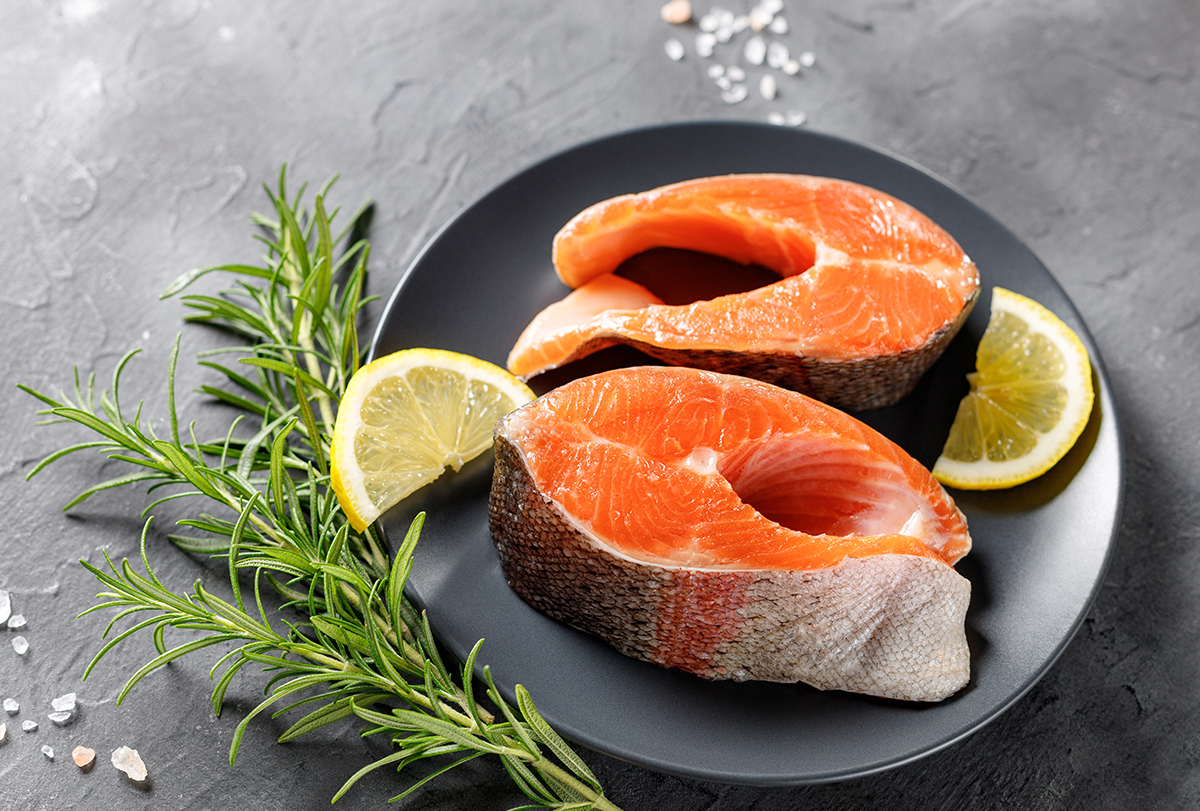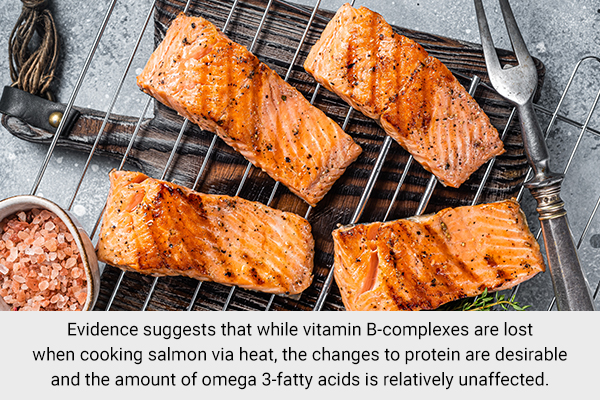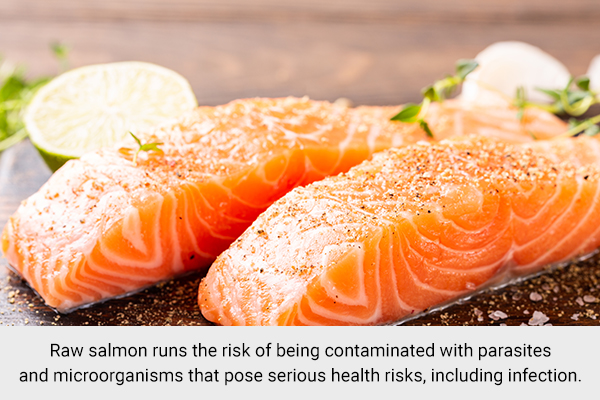In this article:
Salmon is one fish that is eaten and loved both raw and cooked. Based on the region and cuisine, various dishes make use of raw salmon, and it is considered a delicacy.

Salmon is a deep-sea fish that is fished and exported mainly from Nordic countries, but recently, it has also been farmed in countries such as the United States.
While wild salmon feeds on small fishes and crustaceans, farmed salmon are fed a mixed diet of fish and vegetable sources. It is a particularly rich source of omega-3 fatty acids, which are great anti-inflammatory agents and offer protection against many chronic illnesses. (1)
Even though raw salmon is commonly consumed, cooked salmon is better for consumption for various reasons that shall be discussed in this article.
Reasons Raw Salmon Is Not Good for You
These are the reasons you should avoid eating raw salmon, according to experts.
1. It is a source of microorganisms
Salmon, like other animal sources of protein, is contaminated with microorganisms that can cause foodborne illnesses.
Studies have found raw salmon to contain pathogens including Salmonella sp. and Listeria monocytogenes, which grow in number the longer salmon is stored. (2)
These pathogens can cause serious health risks and are major contributors to hospitalization due to infection. According to statistics, the elderly and immunocompromised people are the most susceptible to these infections. (3)
Cooking, whether by baking, steaming, or roasting can kill these pathogens to a large extent, making salmon safe to consume. (4)
2. It can contain parasites
Another potential health risk associated with the consumption of raw salmon is the presence of parasites.
Several studies have found raw fish consumption to be a leading cause of infection with parasites such as fish tapeworm, nematodes, and intestinal or liver flukes. Raw fish is host to the larvae of these parasites, which then complete their life cycle after entering the human body. (5)
Parasites can cause malnutrition, weight loss, nutrient deficiencies, and severe acute illness without treatment. Cooking salmon properly greatly reduces the likelihood of these parasites infecting humans and makes it safe for human consumption. (6)
Won’t Cooking Destroy the Nutrients in Salmon?

You may have heard that cooking food by applying heat destroys certain vitamins such as B vitamins and vitamin C.
Salmon is a rich source of protein, omega-3 fatty acids, vitamin D, and B vitamins. One 100 g serving of raw salmon provides 20.5 g of protein, 50% of the daily requirements of vitamin B3, 36% of the requirement of vitamin B6, 173% of the daily requirement of vitamin B12, 54% of the daily requirement of vitamin D, and 0.6 g of omega-3 fatty acids. (7)
Evidence suggests that vitamin B complexes are lost through cooking via heat, but the changes to protein are desirable and the amount of omega-3 fatty acids is relatively unaffected. (8)
A study comparing grilling and baking to assess losses of B vitamins found that grilling resulted in lesser losses. Grilling resulted in a 45% loss of vitamin B1, 38% loss of B2, and 46% loss of vitamin B3. Therefore, you can opt for grilling over other cooking methods to preserve these vitamins. (9)
Expert Recommendations
While eating raw salmon may emerge as a solution to preserving its vitamin B complex content, its side effects outweigh the benefits. You will only be able to consume small amounts of raw fish at a time, which will not provide enough of the desired nutrients.
In addition, the risk of contaminants and microorganisms is too high when it comes to eating raw fish.
In a nutshell, you indulge in the occasional poke bowl or sashimi, but it is still recommended that you eat your salmon cooked.
How to Properly Cook Salmon
The ideal way to cook salmon is to pan-fry it on medium heat or grill it until cooked. You’ll know the salmon is cooked when the flesh turns pale pink.
Is the Risk of Eating Raw Fish Associated Only With Salmon?
No. All types of raw fish or seafood pose the same health risk and should, ideally, not be eaten.
Practical Takeaways

- Salmon is a deep-sea fish obtained from the cold seas around Nordic countries such as Norway. Salmon is also farmed in other countries to make availability more accessible.
- Salmon is a rich source of omega-3 fatty acids and other nutrients.
- Raw salmon runs the risk of being contaminated with parasites and microorganisms that pose serious health risks including infection.
- Cooking destroys these pathogens and parasites, making salmon safer to consume.
- Was this article helpful?
- YES, THANKS!NOT REALLY


